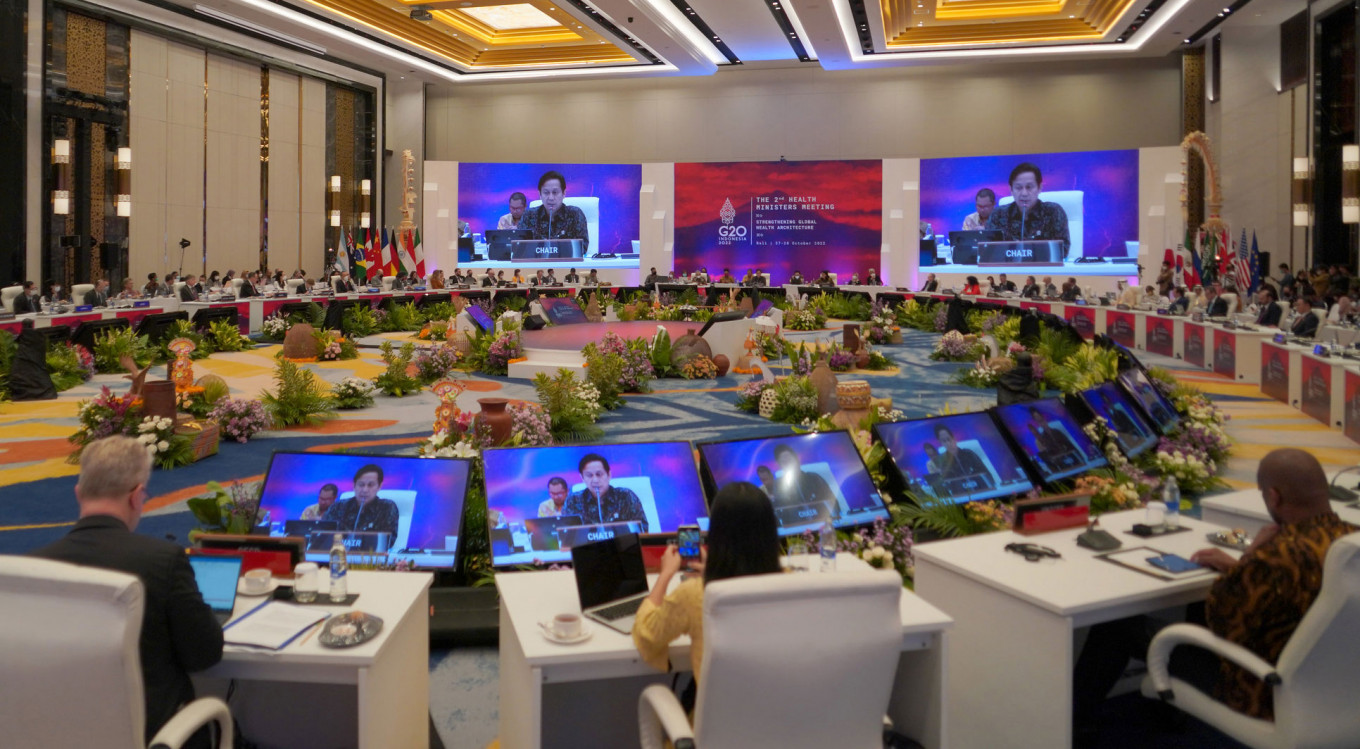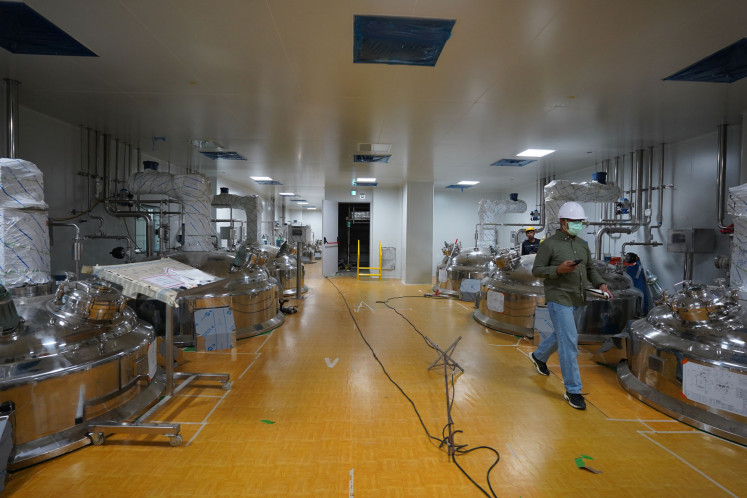Popular Reads
Top Results
Can't find what you're looking for?
View all search resultsPopular Reads
Top Results
Can't find what you're looking for?
View all search resultsG20 Health Ministers’ Meeting delivers six key actions for upcoming Leaders’ Summit
Change text size
Gift Premium Articles
to Anyone

The Group of Twenty (G20) Second Health Ministerial Meeting in Bali, which concluded on Oct. 28, has produced a technical document outlining six crucial actions to be submitted for consideration during the G20 Leaders’ Summit in mid-November.
The Health Ministry’s Communication and Public Service Bureau revealed six key actions, which are:
First, the Health Track has led to the design and launch of the Pandemic Fund. G20 members will continue and deepen the work envisioned for the Joint Finance and Health Task Force (JFHTF) and call on all G20 countries to build on the major concrete achievement of the Pandemic Fund -- previously known as the Financial Intermediary Fund (FIF) on pandemic prevention, preparedness and response.
Second, following the completion of the ACT-A evaluation, G20 countries should continue to lead the shaping of successor entities and functions to ensure the readiness of mechanisms to respond to future pandemics.
Third, under the Indonesian G20 Presidency, G20 member states have brought progress on genomic surveillance, which should pave the way for continued attention and progress as a crucial part of pandemic prevention, preparedness and response.
Fourth, further global collaboration is needed to build on the successes of existing travel-certificate systems while moving toward the interoperability of these systems.
Fifth, conduct a gap analysis and mapping of existing and emerging research and manufacturing networks, which should be taken forward by the Indian presidency of the next G20.
Sixth, concrete actions emerge from the side events of the G20 Health agenda, with a call to action to increase funding to combat tuberculosis, a commitment to implement the One Health initiative and a call to action to enhance improvements in capacity to prevent, detect and respond to AMR.
The meeting, the culmination of G20 discussions about strengthening the global health architecture and strengthening pandemic prevention, preparedness and response, was closed by Health Minister Budi Gunadi Sadikin.
In his closing speech, Budi said that while the current geopolitical tension had been widely reflected over the three-day meeting, G20 member states maintained strong commitment to come together and address global health challenges and find a common solution.
“Despite our differences, the G20 member states have come together to speak the same language -- the language of humanity above all; the language of health that knows no borders,” he said.
Indonesia will pass the G20 Presidency baton to India, where member states will further discuss and pursue joint attempts in addressing global health challenges and strengthening global health architecture.
Health protocol standard
The Heath Ministry’s Communication and Public Service Bureau said in a statement earlier that harmonizing the document regarding the travelers related to the COVID-19 pandemic or the health protocols was of utmost importance in promoting global mobility and accelerating economic recovery.
The improving COVID-19 pandemic situation has prompted the government of Indonesia to relax a policy that limits the mobility while taking steps to mitigate health risks.
The frequently asked question is: will the government implement health protocols when the COVID-19 pandemic is over?
Risk-based approaches are used to harmonize health-protocol standards while considering other factors such as disease epidemiology and health-capacity systems.
Several crucial aspects in harmonizing protocol standards cover political and legal aspects, capacity, reaching out of states, ethical, technical matters, adaption capability regarding quick changes and technology utilization.
G20 member countries were invited to participate in a pilot project, the Global Public Trust Repository. The pilot project requires the G20 countries to distribute public keys and will be stored in a repository platform, which enables the verification of the origin of the certificate.
The COVID-19-related document from the G20 member countries will be recognized via a QR Code on the certificate on arrival and departure, still protecting the privacy and security of data.
Meanwhile, Budi said earlier in a press conference in Bali that global health-protocol standards served as a device for every country. “Even when the COVID-19 pandemic has ended, the health protocol standards still serve as a device to anticipate the next pandemic,” he said.
“Digital passport-based global health-protocol standards can be utilized in the event of the occurrence of pandemic in the future, because the instrument is already available,” he said.
The global health-protocol standards that have been collectively agreed upon would facilitate the movement of goods and people in times of pandemic so that the wheel of the economy could still move on and, at the same time, provide access to the needed tools and medicines.
Indonesia intends to achieve four other targets, including setting up emergency funds for the future and, at the same time, developing the mechanism of the use of funds so that the access to vaccines, therapies and diagnostic tools could be provided in a fair manner.
In addition to that, Indonesia eagerly wants to build a global genome-sequencing laboratory network and redistribute resources and capacity of development and production of vaccines, therapies and diagnostic devices globally.
Referring to the Balinese philosophy of Tri Hita Karana, which emphasizes the harmonious relationship with God, environment and fellow humankind, which leads to people’s prosperity, Budi said that the principle was utilized as a COVID-19 pandemic-recovery endeavor.
The Tri Hita Kirana philosophy was implemented in every meeting of the G20 presidency, which produced concrete outcomes arising from the pandemic and readiness to face the next pandemic.
Previously, the three-day meeting by the Health Working Group (HWG) discussed harmonizing global health protocol standards; building the global health-resilience system; and expanding global manufacture, a research center for global prevention, preparedness and response to pandemic.
The side event also featured a discussion on urgent health challenges such as tuberculosis, One Health and anti-microbe resistance.
According to Budi, the idea of PPR FIF came up in Saudi Arabia’s G20 presidency and Italy’s G20 presidency, followed by the Indonesian G20 presidency.
He noted that the PPR FIF had started to operate with a total commitment of over US$1.4 billion, contributed by G20 countries and three philanthropists.
The Health Ministry’s Communication and Public Service Bureau also said that an Access to COVID-19 Tools-Accelerators (ACT-A) form in the meeting aimed to complete the financing of pandemic PPR and mobilize the essential health resources.
“The review will help build the future working framework for every country to access medical assistance in times of health-emergency situations,” it said.
In addition to that, the meeting would also optimize supervision on the global genome. Apart from providing the resources, the meeting would strengthen the supervision of the genome to prevent pandemic risk, which is also very crucial.
Budi was confident that it was important to share data on pathogens on a trusted and reliable data-sharing platform that could be accessed by the public, particularly a platform that meets principles of open access, accuracy, being on time and representation.
According to Budi, to enable the safety of cross-border mobility and to accelerate the economic recovery, the G20 Technical Working Group facilitated by WHO, OCD and Global Digital Health Partnership (GDHP) have developed a mechanism that countries can use to recognize the digital COVID-19 certificate while respecting the privacy and security of data.
Finally, Budi said, “We are aware of the importance of expanding the research and production capacity related to the device of vaccines, therapy and diagnostic (VTD); we support mRNA WHO initiatives in Argentina, Brazil and South Africa; and other collaborative efforts.”
He revealed that seven members of the G20, including Indonesia, had expressed interest in building a research manufacturing and VTD ecosystem.
“With the spirit of Tri Hita Karana, I hope that we, as the current leader of the G20 countries, can continue to unite and struggle for shared health and prosperity,” said Budi.
This article was published in collaboration with Ministry of Health Republic of Indonesia










